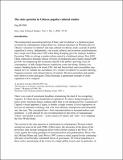The state question in Chinese popular cultural studies
Author(s)
Wang, Jing
Downloadthe state question in chinese popular cultural studies.pdf (199.5Kb)
PUBLISHER_POLICY
Publisher Policy
Article is made available in accordance with the publisher's policy and may be subject to US copyright law. Please refer to the publisher's site for terms of use.
Terms of use
Metadata
Show full item recordAbstract
The metonymical association between 'China’ and 'revolution' is a rhetorical game savoured by contemporary China observers. Ironical references in Western press to Chinese 'consumer revolution7 and 'pop cultural revolution, made a parade of global capitalism's victory. Indisputably, vast social, cultural, and economic transformations have swept over China since 1992 when Deng Xiaoping gave his strategic Southern Excursion Talks to salvage a market reform mired in a bottleneck phase. Post-1992 China witnessed a dramatic release of forces of production and a steady annual GDP growth. Accompanying this economic takeoff is the public's growing craze for
consumption. A fully fledged buyers' market has come into being. Chinese consumers, budding desires for music CDs, fast and frozen food, and convertibles may indeed serve to validate the ascendance of a 'counter-revolution' to socialist ideology. Tugging economic and cultural indexes in tandem, Western journalists and pundits have shown us time and again: China illustrates a paramount example of crony capitalism's new conquest.
Date issued
2001-12Department
Massachusetts Institute of Technology. Global LanguagesJournal
Inter-Asia Cultural Studies
Publisher
Taylor & Francis
Citation
Wang, Jing. “The State Question in Chinese Popular Cultural Studies.” Inter-Asia Cultural Studies 2.1 (2001): 35–52.
Version: Author's final manuscript
ISSN
1464-9373
1469-8447